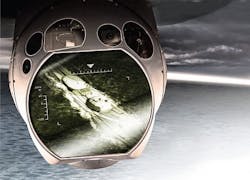Air Force asks Raytheon to build and upgrade electro-optical AN/DAS-4 multispectral aircraft sensor
Officials of the Air Force Life Cycle Management Center at Wright-Patterson Air Force Base, Ohio, announced an $281.9 million contract Friday to the Raytheon Space and Airborne Systems segment in McKinney, Texas, to build and upgrade AN/DAS-4 multispectral targeting system (MTS) Model B high-definition and target location accuracy turrets.
The AN/DAS-4 multispectral system offers four high-definition cameras covering five spectral bands; a three-color diode pump laser designator and rangefinder; laser spot search and track capability; automated sensor and laser bore sight alignment; three mode target tracker; and built in provisions for future growth, Raytheon officials say.
The contract calls for Raytheon to provide 127 AN/DAS-4 MTS-B high-definition and target-location accuracy turrets; 40 DAS-1A to DAS-4 turret unit upgrades; one lot of initial shop replaceable unit spares; one lot of capacity increase production support; and one lot of data.
The AN/DAS-4, the latest variant of the Raytheon MTS sensor family, incorporates greater fire control and target location accuracy technology than previous MTS versions for precise coordinates.
The AN/DAS-4 MTS enables mission commanders to use high-definition data from an airborne tactical sensor to identify and engage targets with much greater accuracy than previous-generation systems could, Raytheon officials say. This sensor system also is going aboard the U.S. Navy MQ-4C Triton long-range maritime patrol UAV.
This advanced electro-optical and infrared (EO/IR) system provides tracking and laser designation for the Griffin and Paveway missiles, as well as all tri-service and NATO laser-guided munitions. MTS sensors offer several fields of view, electronic zoom, and multimode video tracking.
Multispectral sensors divide images and video into several light wavelengths -- typically three to 15 spectral bands -- across the electromagnetic spectrum, including light from frequencies beyond the visible light range such as infrared and ultra-violet.
Dividing images into several different wavelengths enables the sensor to extract additional information the human eye fails to capture with its receptors for red, green, and blue.
The L-3 Technologies Advanced Laser Systems Technology (ALST) segment in Orlando, Fla., is providing the eye-safe laser rangefinders for the Raytheon MTS.
On this contract Raytheon will do the work in McKinney, Texas, and should be finished by September 2020. For more information contact Raytheon Space and Airborne Systems online at www.raytheon.com, or the Air Force Life Cycle Management Center at www.wpafb.af.mil/aflcmc.
Ready to make a purchase? Search the Military & Aerospace Electronics Buyer's Guide for companies, new products, press releases, and videos
